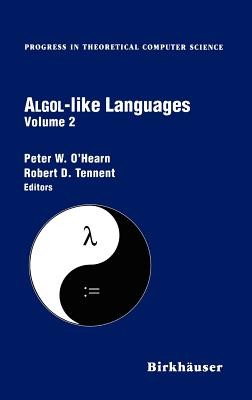
- We will send in 10–14 business days.
- Author: Peter O'Hearn
- Publisher: Birkhäuser
- ISBN-10: 0817639373
- ISBN-13: 9780817639372
- Format: 16 x 24.1 x 2.1 cm, hardcover
- Language: English
- SAVE -10% with code: EXTRA
Reviews
Description
To construct a compiler for a modern higher-level programming languagel one needs to structure the translation to a machine-like intermediate language in a way that reflects the semantics of the language. little is said about such struc- turing in compiler texts that are intended to cover a wide variety of program- ming languages. More is said in the Iiterature on semantics-directed compiler construction [1] but here too the viewpoint is very general (though limited to 1 languages with a finite number of syntactic types). On the other handl there is a considerable body of work using the continuation-passing transformation to structure compilers for the specific case of call-by-value languages such as SCHEME and ML [21 3]. ln this paperl we will describe a method of structuring the translation of ALGOL-like languages that is based on the functor-category semantics devel- oped by Reynolds [4] and Oles [51 6]. An alternative approach using category theory to structure compilers is the early work of F. L. Morris [7]1 which anticipates our treatment of boolean expressionsl but does not deal with procedures. 2 Types and Syntax An ALGOL-like language is a typed lambda calculus with an unusual repertoire of primitive types. Throughout most of this paper we assume that the primi- tive types are comm(and) int(eger)exp(ression) int(eger)acc(eptor) int(eger)var(iable) I and that the set 8 of types is the least set containing these primitive types and closed under the binary operation -.
EXTRA 10 % discount with code: EXTRA
The promotion ends in 19d.14:48:02
The discount code is valid when purchasing from 10 €. Discounts do not stack.
- Author: Peter O'Hearn
- Publisher: Birkhäuser
- ISBN-10: 0817639373
- ISBN-13: 9780817639372
- Format: 16 x 24.1 x 2.1 cm, hardcover
- Language: English English
To construct a compiler for a modern higher-level programming languagel one needs to structure the translation to a machine-like intermediate language in a way that reflects the semantics of the language. little is said about such struc- turing in compiler texts that are intended to cover a wide variety of program- ming languages. More is said in the Iiterature on semantics-directed compiler construction [1] but here too the viewpoint is very general (though limited to 1 languages with a finite number of syntactic types). On the other handl there is a considerable body of work using the continuation-passing transformation to structure compilers for the specific case of call-by-value languages such as SCHEME and ML [21 3]. ln this paperl we will describe a method of structuring the translation of ALGOL-like languages that is based on the functor-category semantics devel- oped by Reynolds [4] and Oles [51 6]. An alternative approach using category theory to structure compilers is the early work of F. L. Morris [7]1 which anticipates our treatment of boolean expressionsl but does not deal with procedures. 2 Types and Syntax An ALGOL-like language is a typed lambda calculus with an unusual repertoire of primitive types. Throughout most of this paper we assume that the primi- tive types are comm(and) int(eger)exp(ression) int(eger)acc(eptor) int(eger)var(iable) I and that the set 8 of types is the least set containing these primitive types and closed under the binary operation -.


Reviews